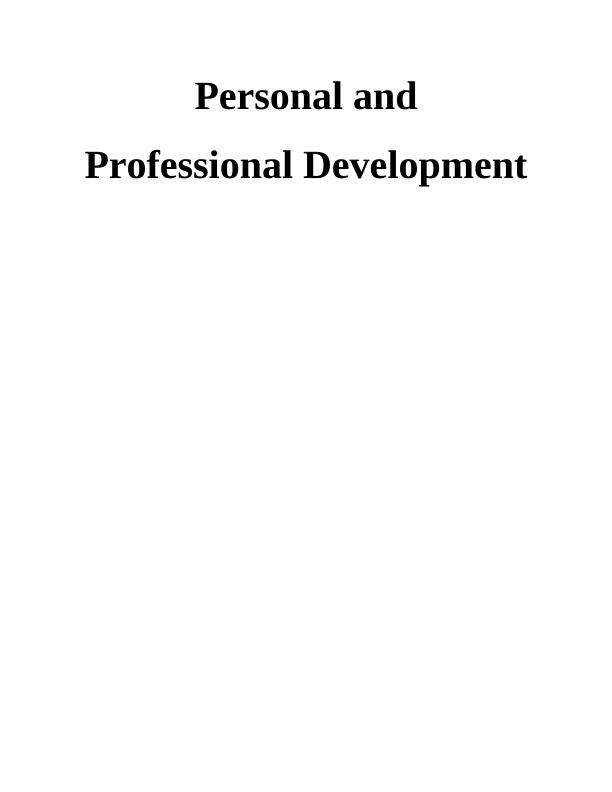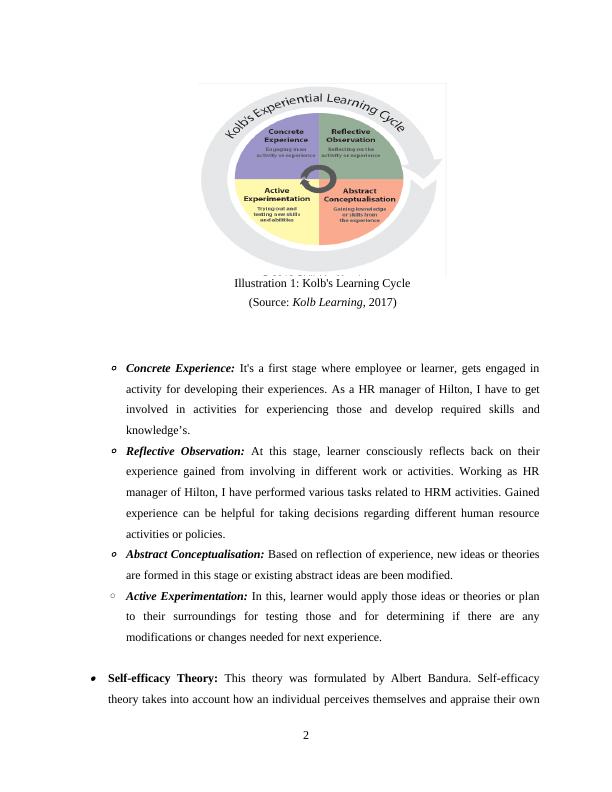Benefits of Self-managed Learning: Doc
Added on 2021-01-01
15 Pages3941 Words370 Views
Personal and
Professional Development
Professional Development

Table of Content
INTRODUCTION...........................................................................................................................1
TASK 1............................................................................................................................................1
1.1 Approaches to self-managed learning...................................................................................1
1.2 Ways to encourage lifelong learning in Personal and Professional contexts........................4
1.3 Benefits of Self-managed Learning.......................................................................................5
TASK 3............................................................................................................................................6
3.1 Processes and activities for implementing development plan...............................................6
3.2 Undertake and document development activities planned....................................................7
3.3 Reflection on own learning against original aims and objectives.........................................9
3.4 Updated development plan based on feedback and evaluation...........................................10
CONCLUSION..............................................................................................................................12
REFERENCES..............................................................................................................................13
INTRODUCTION...........................................................................................................................1
TASK 1............................................................................................................................................1
1.1 Approaches to self-managed learning...................................................................................1
1.2 Ways to encourage lifelong learning in Personal and Professional contexts........................4
1.3 Benefits of Self-managed Learning.......................................................................................5
TASK 3............................................................................................................................................6
3.1 Processes and activities for implementing development plan...............................................6
3.2 Undertake and document development activities planned....................................................7
3.3 Reflection on own learning against original aims and objectives.........................................9
3.4 Updated development plan based on feedback and evaluation...........................................10
CONCLUSION..............................................................................................................................12
REFERENCES..............................................................................................................................13

INTRODUCTION
Personal and professional development is required by an individual for helping them to
encourage learning for meeting certain organisational challenges and for achieving objectives or
goals of enterprise (Hildebrand, 2018). Personal and professional development aims to help
person or employees for managing their own growth through learning throughout their career. In
this report, various self-managed learning approaches are been evaluated for developing required
skills and knowledge. Ways to encourage lifelong learning for personal and professional
development is been determined. Benefits of self-managed learning for both individuals and
organisation are been identified. Various activities and processes that are required for
implementing development plan are been discussed. Different developmental activities are been
identified. Reflection on own learning is been assessed along with updated development plan on
basis of feedback and evaluation done by superiors, mentors and peers.
TASK 1
1.1 Approaches to self-managed learning.
Self-managed learning refers to the process of identifying learning needs, developing
goals and determining resources for learning, by an individual with or without help of others
(Megginson and Whitaker, 2017). It is essential in an organisation as every individual persons
are different from others in what and how they learn. To adopt various changes, including
organisational changes, employees are required to learn new skills or knowledge for increase
their efficiency.
Following self-managed learning approaches can be used:
David Kolb – Experiential Approach: Basis of this learning theory is been formed
through constantly reviewing experiences and challenges. It consists of four stages
representing cyclical model of teaching (Cunningham, 2017). Below are stages involved
in experiential approach:
1
Personal and professional development is required by an individual for helping them to
encourage learning for meeting certain organisational challenges and for achieving objectives or
goals of enterprise (Hildebrand, 2018). Personal and professional development aims to help
person or employees for managing their own growth through learning throughout their career. In
this report, various self-managed learning approaches are been evaluated for developing required
skills and knowledge. Ways to encourage lifelong learning for personal and professional
development is been determined. Benefits of self-managed learning for both individuals and
organisation are been identified. Various activities and processes that are required for
implementing development plan are been discussed. Different developmental activities are been
identified. Reflection on own learning is been assessed along with updated development plan on
basis of feedback and evaluation done by superiors, mentors and peers.
TASK 1
1.1 Approaches to self-managed learning.
Self-managed learning refers to the process of identifying learning needs, developing
goals and determining resources for learning, by an individual with or without help of others
(Megginson and Whitaker, 2017). It is essential in an organisation as every individual persons
are different from others in what and how they learn. To adopt various changes, including
organisational changes, employees are required to learn new skills or knowledge for increase
their efficiency.
Following self-managed learning approaches can be used:
David Kolb – Experiential Approach: Basis of this learning theory is been formed
through constantly reviewing experiences and challenges. It consists of four stages
representing cyclical model of teaching (Cunningham, 2017). Below are stages involved
in experiential approach:
1

◦ Concrete Experience: It's a first stage where employee or learner, gets engaged in
activity for developing their experiences. As a HR manager of Hilton, I have to get
involved in activities for experiencing those and develop required skills and
knowledge’s.
◦ Reflective Observation: At this stage, learner consciously reflects back on their
experience gained from involving in different work or activities. Working as HR
manager of Hilton, I have performed various tasks related to HRM activities. Gained
experience can be helpful for taking decisions regarding different human resource
activities or policies.
◦ Abstract Conceptualisation: Based on reflection of experience, new ideas or theories
are formed in this stage or existing abstract ideas are been modified.
◦ Active Experimentation: In this, learner would apply those ideas or theories or plan
to their surroundings for testing those and for determining if there are any
modifications or changes needed for next experience.
Self-efficacy Theory: This theory was formulated by Albert Bandura. Self-efficacy
theory takes into account how an individual perceives themselves and appraise their own
2
Illustration 1: Kolb's Learning Cycle
(Source: Kolb Learning, 2017)
activity for developing their experiences. As a HR manager of Hilton, I have to get
involved in activities for experiencing those and develop required skills and
knowledge’s.
◦ Reflective Observation: At this stage, learner consciously reflects back on their
experience gained from involving in different work or activities. Working as HR
manager of Hilton, I have performed various tasks related to HRM activities. Gained
experience can be helpful for taking decisions regarding different human resource
activities or policies.
◦ Abstract Conceptualisation: Based on reflection of experience, new ideas or theories
are formed in this stage or existing abstract ideas are been modified.
◦ Active Experimentation: In this, learner would apply those ideas or theories or plan
to their surroundings for testing those and for determining if there are any
modifications or changes needed for next experience.
Self-efficacy Theory: This theory was formulated by Albert Bandura. Self-efficacy
theory takes into account how an individual perceives themselves and appraise their own
2
Illustration 1: Kolb's Learning Cycle
(Source: Kolb Learning, 2017)

End of preview
Want to access all the pages? Upload your documents or become a member.
Related Documents
Personal and Professional Development in Hilton Hotellg...
|19
|5068
|35
Assignment on Personal and professional development Solvedlg...
|16
|5114
|479
Unit 23: Personal and Professional Development Assignmentlg...
|23
|6720
|495
Self-Managed Lifelong Learning in Personal and Professional Developmentlg...
|18
|4191
|379
Self Managed Learning in Personal and Professional Developmentlg...
|12
|4260
|239
Report on Personal Professional Development - Hilton Hotels & Resortslg...
|17
|4010
|40